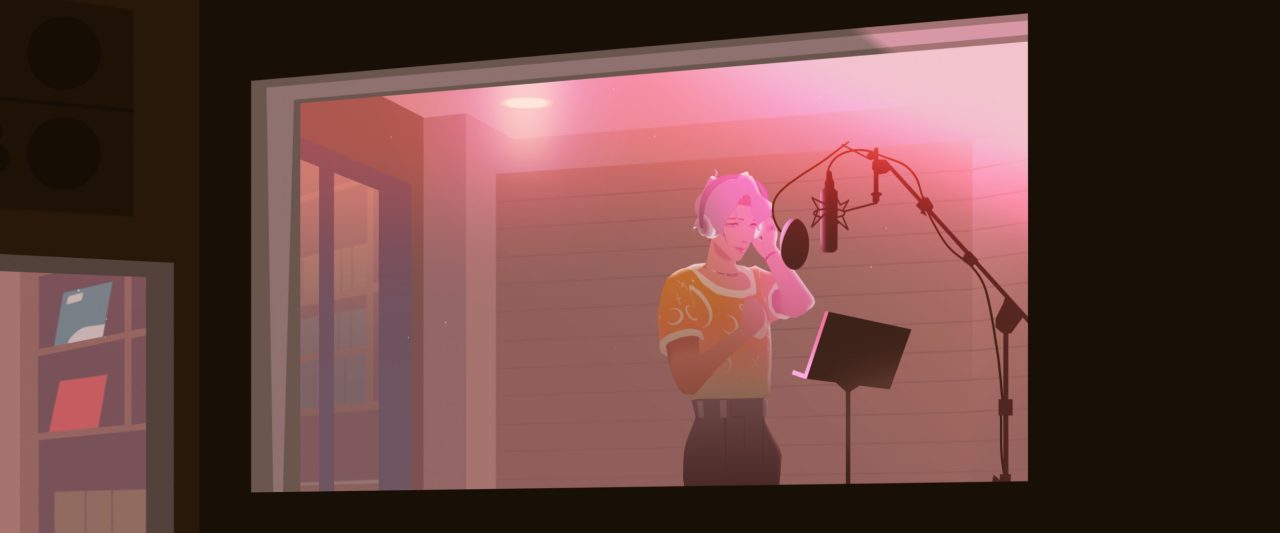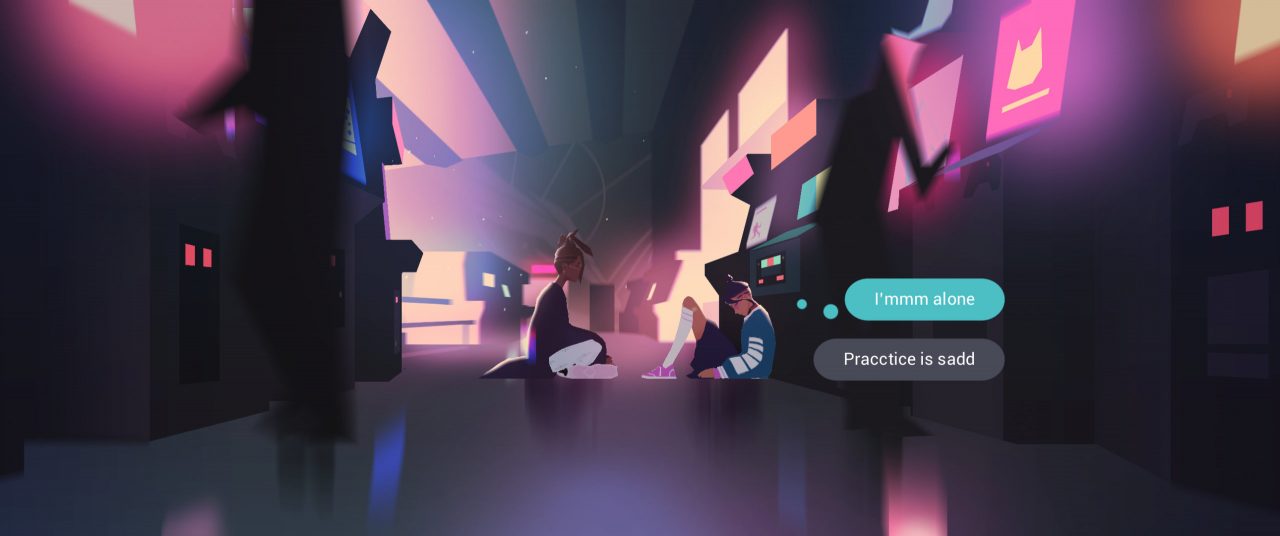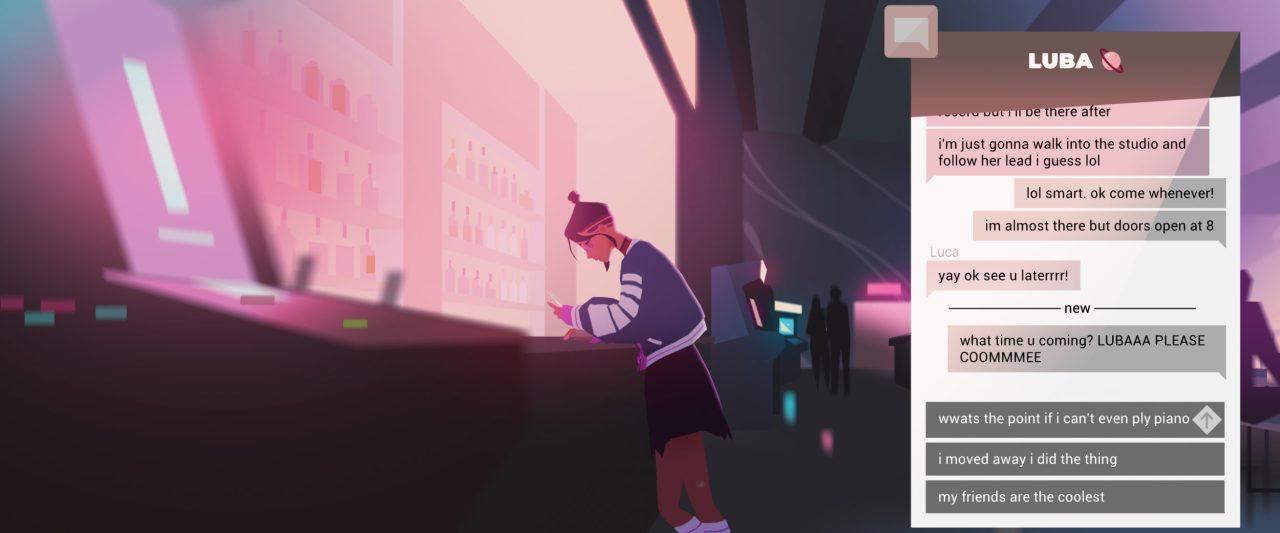I’ve long believed that music is a universal language. Even with disparate genres, cultural traditions, and languages, we are all inescapably drawn to music. And I also believe that anyone who enjoys singing or playing an instrument has at one point dreamed about making a career out of it. Maybe it’s on Broadway, in a well-renowned symphony, or on the pop charts, but the idea of making music for a living is an earworm that most of us have experienced at one point or another. After all, there are few things more exciting than the idea of forming a band with your friends, making a hit single, and becoming highly successful rock stars. This is the story behind We Are OFK, and while the game is not without a few issues, it is ultimately a wonderful and heartfelt tale with some killer pop songs to jam to along the way.
We Are OFK is the brainchild of indie developer Team OFK, and the idea behind it is perhaps as interesting as the content of the game itself. Described as a “music biopic game,” We Are OFK tells the story of how a fictional band called OFK came into existence and released their first hit EP. If you’ve ever seen The Monkees (the 60s TV series) or NBC’s Smash more recently, the concept is very similar. The story and band are fictional, but the songs are real. Composed and recorded by Team OFK, with lead vocals from the game’s creative director, Teddy Dief, the band’s music is available to stream and purchase digitally right now, with a physical release planned for the future.

With that out of the way, let’s talk about this fictional biopic. Over the course of We Are OFK’s five episodes, you get to watch a group of musically and artistically talented LA friends stumble their way into forming an indie pop band. Each of the four main characters has their baggage and hangups that hinder the group’s goals. For example, pianist Itsumi Saito is dealing with a bad breakup while she practices for a concerto recital, and lyricist/lead vocalist Luca Le Fae has trouble committing to songwriting while he deals with his day job and a neverending search for love. A chance encounter with music producer Jey Zhang at a party sends Luca — and eventually Itsumi and their mutual friend, Carter Flores — down the uncertain path of recording music professionally. It is, of course, not a smooth ride, but it’s also rarely uninteresting.
The main cast is endearing, and the writing is down to earth. There’s a healthy dose of slang and pop culture references that make dialogue and texts feel natural, a plus further enhanced by the excellent voice acting across the board. Speaking of the voice actors, I was impressed by Team OFK’s commitment to using actors whose racial identities match their characters. For instance, Itsumi is a Japanese-American character voiced by a Japanese-American actress, and both Jey’s character and voice actress are Chinese-American. There’s also some appreciated LGBTQ+ representation in We Are OFK. Luca is bi, and Carter is non-binary, to name a few. Like the dialogue, the characters’ identities are treated very naturally — which is to say, they just live their lives normally, and the story neither focuses on nor makes any conflicts out of their queerness.

As intriguing as We Are OFK’s concept is, and as relatable as the cast may be, the story occasionally feels a little too meandering. This isn’t as noticeable in the first few episodes, but it becomes more pronounced in the last two episodes as the game finally gives one of the main characters some much-needed development. Unfortunately, this feels like filler so the main conflict’s resolution can be pushed off until the last minute in the final episode. I still enjoyed the story from start to finish, but I do wish the back half had better pacing.
Some of the pacing issues also come from We Are OFK’s gameplay, or rather the lack of it. The majority of each episode involves watching the characters do their own thing and talk amongst themselves. Occasionally, you get the chance to select a dialogue or text response, but these choices have no impact on the direction of the plot. This isn’t exactly a narrative adventure game where you can change how the story goes, which also means there’s not much replay value beyond collecting trophies and jamming out to the band’s music — which you can conveniently do directly from the main menu after you finish each episode. One thing I truly appreciate, though, was that the game gave me the option to have unlimited time to select responses. By default, you have ten seconds to make your choices, but I’ve never really been a fan of the pressure a time limit like that creates, so it was nice to remove it entirely.

One of the best things about We Are OFK is, of course, the band’s music. Every episode features a song, and they are all fantastic. I went through each several times just to listen to them again, and I’m definitely going to be picking up the EP. Each song comes with an interactive music video where you can play little minigames in time with the music. These sequences are really where most of the gameplay in We Are OFK happens, but it’s all pretty basic and just for fun. You can’t fail any of these minigames, though there are trophies associated with each for completionists to collect. The controls in these games are also a little stiff and awkward sometimes, but given that the rest of the game is just selecting dialogue choices, I wasn’t exactly expecting something super smooth and responsive. In fact, I wasn’t expecting anything, so it was a delightful surprise to get to play around in these dreamscape worlds.
Last but not least, let’s talk about We Are OFK’s visuals. The visuals were one of the most immediately arresting elements of the game’s reveal trailer, and visual design remains one of the game’s most unique aspects in the full release. Character designs and backgrounds are stylistic and minimalist, creating an almost indie comic book or cartoon look. Backgrounds are colorful but static, with a hand-drawn quality reminiscent of visual novels. Characters animate in a limited fashion which is definitely more detailed than your standard VN, but their expressions and movement are fairly limited and occasionally look a little goofy. I’d love to see this art style with a little more movement and active backgrounds, but you really can’t deny that it looks great as is.
We Are OFK came out of nowhere and immediately captured my attention. While the game’s concept has been done before on TV, this is, to my knowledge, the first time a video game has told the story of a fictional (or perhaps I should say, virtual) band that makes and releases real music. Really good music that I may or may not be listening to as I write this review. The plot has a few pacing issues and the gameplay is limited, but the art style is undeniably attractive, the writing is great, and I love the cast. If a future sequel — shall we say a season two? — means more time with these messed-up goofballs and more great music, I’m all for it.


